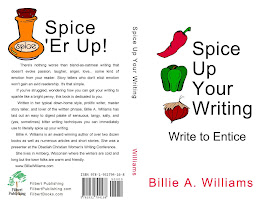Mysteries (and nearly every other genre) deal with people in the grasp of powerful emotions. It stands to reason a reader may very well, reading from a similar situation of greed, fury, revenge, love or lust, feel a connection to the author of a well-told mystery. Both mystery reader and mystery writer glean a certain sense of satisfaction from the encounter on the pages of the novel.
As the writer looks inside him or herself--for reactions, or obsessions with certain issues, truth boils up from within. Angry with an insurance company over lack of coverage, high fees and no results, Billie A Williams' mystery novel's antagonist, Arnold Beeblebox, in the throes of revenge (Skull Music ) extracts revenge that turns him into a serial killer. The mystery writer writing what s/he feels will resonate with a reader of similar likes and dislikes will find a fan base. Someone who knows what it's like to have those same feelings reads your work and your words resonate with him/her.
) extracts revenge that turns him into a serial killer. The mystery writer writing what s/he feels will resonate with a reader of similar likes and dislikes will find a fan base. Someone who knows what it's like to have those same feelings reads your work and your words resonate with him/her.
If you examine a book by your favorite author you may come to understand what they are passionate about, what they care about. Patricia Cornwell cares about discovering all the details a body can tell her about a crime in order to insure the guilty party is brought to justice. Mary Higgins Clark cares more about ordinary people who just happen to be caught in not so ordinary, or even extraordinary, circumstances. Tony Hillerman, on the other hand, cares about one particular group of people, the Navajo people and their culture. Nevada Barr may be looking out for our national parks in her position as forest ranger, that is her passion—environmentalist perhaps. Find the cause that trips your trigger and elicits a passionate response, and like minds in the form of readers will follow your lead.
Irritants produce reactions. From a co-worker you dislike to a blister on your heel. The more irritating the thorn in your side the more you are likely to seek relief. So it is with writing, especially, a mystery. Your main character, your protagonist is either seeking to escape from something or is racing toward something. Human behavior will always provide fodder for the gist mill of the mystery writer. What does your character want? What lengths is he/she willing to go through to get it?
In the same vein, your antagonist also wants something. His/her wants are in direct conflict with the protagonist. Conflict makes the story an interesting read for your audience—or you—if you are the reader. Without conflict there is no story.
The mystery writer ponders, what if? The mystery reader follows with, what next? Twists, turns, red herrings address these questions and more.
You needn't stop at human behavior, think about places. Places may ignite a writer/readers sense of mystery. Small towns (Small Town Secrets) there are always those skeletons hiding in someone's closet. Florida's swampy keys to the Bermuda Triangle (Spider Island ) or Cairo, Egypt—pyramids and intrigue or the diamond mines of Africa (Death, Diamonds and Deceit
) or Cairo, Egypt—pyramids and intrigue or the diamond mines of Africa (Death, Diamonds and Deceit ) places can pique interest and drive a story.
) places can pique interest and drive a story.
What mix stirs your passion? There is a mystery author who can fill your need for revenge, karma, or comeuppance. If you're the author who pens the tale with passion fueled emotion, your reader is searching for you.
Make your reading time absorbing. Pit your wits against the accidental sleuth, who may be in a job like yours. Subscribe to my free e-zine Mystery Readers and Working Writers, the free e-zine for mystery lovers. Get a free e-booklet “ A Nice Quiet Family” a very short/flash mystery. http://www.billiewilliams.com











No comments:
Post a Comment